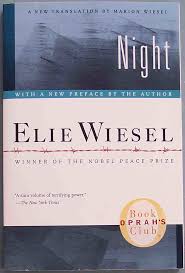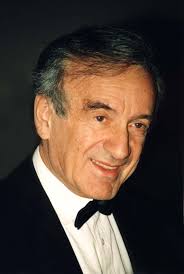Night Page #12
"Night" is a work by Elie Wiesel about his experience with his father in the Nazi German concentration camps at Auschwitz and Buchenwald in 1944–1945, at the height of the Holocaust toward the end of the Second World War. In just over 100 pages of sparse and fragmented narrative, Wiesel writes about the death of God and his own increasing disgust with humanity, reflected in the inversion of the parent–child relationship, as his father declines to a helpless state and Wiesel becomes his resentful teenage caregiver. "If only I could get rid of this dead weight ... Immediately I felt ashamed of myself, ashamed forever." In Night everything is inverted, every value destroyed. "Here there are no fathers, no brothers, no friends", a kapo tells him. "Everyone lives and dies for himself alone." Wiesel was 16 when Buchenwald was liberated by the United States Army in April 1945, too late for his father, who died after a beating while Wiesel lay silently
One day when Idek was venting his fury, I happened to cross his path. He threw himself on me like a wild beast, beating me in the chest, on my head, throwing me to the ground and picking me up again, crushing me with ever more violent blows, until I was covered in blood. As I bit my lips in order not to howl with pain, he must have mistaken my silence for defiance and so he continued to hit me harder and harder. Abruptly, he calmed down and sent me back to work as if nothing had happened. As if we had taken part in a game in which both roles were of equal importance. I dragged myself to my corner. I was aching all over. I felt a cool hand wiping the blood from my forehead. It was the French girl. She was smiling her mournful smile as she slipped me a crust of bread. She looked straight into my eyes. I knew she wanted to talk to me but that she was paralyzed with fear. She remained like that for some time, and then her face lit up and she said, in almost perfect German: "Bite your lips, little brother...Don't cry. Keep your anger, your hate, for another day, for later. The day will come but not n o w ... W a i t . Clench your teeth and w a i t ... " MANY YEARS LATER, in Paris, I sat in the Metro, reading my newspaper. Across the aisle, a beautiful woman with dark hair and dreamy eyes. I had seen those eyes before. "Madame, don't you recognize me?" "I don't know you, sir." "In 1944, you were in Poland, in Buna, weren't you?" "Yes, b u t ... " "You worked in a depot, a warehouse for electrical p a r t s ... " "Yes," she said, looking troubled. And then, after a moment of silence: "Wait...I do remember..." "Idek, the K a p o ... t h e young Jewish b o y ... y o u r sweet words..." We left the Métro together and sat down at a café terrace. We spent the whole evening reminiscing. Before parting, I said, "May I ask one more question?" "I know what it is: Am I J e w i s h ... ? Yes, I am. From an observant family. During the Occupation, I had false papers and passed as Aryan. And that was how I was assigned to a forced labor unit. When they deported me to Germany, I eluded being sent to a concentration camp. At the depot, nobody knew that I spoke German; it would have aroused suspicion. It was imprudent of me to say those few words to you, but I knew that you would not betray me..." ANOTHER TIME we were loading diesel motors onto freight cars under the supervision of some German soldiers. Idek was on edge, he had trouble restraining himself. Suddenly, he exploded. The victim this time was my father. "You old loafer!" he started yelling. "Is this what you call working?" And he began beating him with an iron bar. At first, my father simply doubled over under the blows, but then he seemed to break in two like an old tree struck by lightning. I had watched it all happening without moving. I kept silent. In fact, I thought of stealing away in order not to suffer the blows. What's more, if I felt anger at that moment, it was not directed at the Kapo but at my father. Why couldn't he have avoided Idek's wrath? That was what life in a concentration camp had made of me... Franek, the foreman, one day noticed the gold crown in my mouth: "Let me have your crown, kid." I answered that I could not because without that crown I could no longer eat. "For what they give you to eat, k i d ... " I found another answer: my crown had been listed in the register during the medical checkup; this could mean trouble for us both."If you don't give me your crown, it will cost you much more!" All of a sudden, this pleasant and intelligent young man had changed. His eyes were shining with greed. I told him that I needed to get my father's advice. "Go ahead, kid, ask. But I want the answer by tomorrow." When I mentioned it to my father, he hesitated. After a long silence, he said: "No, my son. We cannot do this." "He will seek revenge!" "He won't dare, my son." Unfortunately, Franek knew how to handle this; he knew my weak spot. My father had never served in the military and could not march in step. But here, whenever we moved from one place to another, it was in step. That presented Franek with the opportunity to torment him and, on a daily basis, to thrash him savagely. Left, right: he punched him. Left, right: he slapped him. I decided to give my father lessons in marching in step, in keeping time. We began practicing in front of our block. I would command: "Left, right!" and my father would try. The inmates made fun of us: "Look at the little officer, teaching the old man to march...Hey, little general, how many rations of bread does the old man give you for this?" But my father did not make sufficient progress, and the blows continued to rain on him. "So! You still don't know how to march in step, you old goodfor-nothing?"
Translation
Translate and read this book in other languages:
Select another language:
- - Select -
- 简体中文 (Chinese - Simplified)
- 繁體中文 (Chinese - Traditional)
- Español (Spanish)
- Esperanto (Esperanto)
- 日本語 (Japanese)
- Português (Portuguese)
- Deutsch (German)
- العربية (Arabic)
- Français (French)
- Русский (Russian)
- ಕನ್ನಡ (Kannada)
- 한국어 (Korean)
- עברית (Hebrew)
- Gaeilge (Irish)
- Українська (Ukrainian)
- اردو (Urdu)
- Magyar (Hungarian)
- मानक हिन्दी (Hindi)
- Indonesia (Indonesian)
- Italiano (Italian)
- தமிழ் (Tamil)
- Türkçe (Turkish)
- తెలుగు (Telugu)
- ภาษาไทย (Thai)
- Tiếng Việt (Vietnamese)
- Čeština (Czech)
- Polski (Polish)
- Bahasa Indonesia (Indonesian)
- Românește (Romanian)
- Nederlands (Dutch)
- Ελληνικά (Greek)
- Latinum (Latin)
- Svenska (Swedish)
- Dansk (Danish)
- Suomi (Finnish)
- فارسی (Persian)
- ייִדיש (Yiddish)
- հայերեն (Armenian)
- Norsk (Norwegian)
- English (English)
Citation
Use the citation below to add this book to your bibliography:
Style:MLAChicagoAPA
"Night Books." Literature.com. STANDS4 LLC, 2024. Web. 23 Dec. 2024. <https://www.literature.com/book/night_336>.




Discuss this Night book with the community:
Report Comment
We're doing our best to make sure our content is useful, accurate and safe.
If by any chance you spot an inappropriate comment while navigating through our website please use this form to let us know, and we'll take care of it shortly.
Attachment
You need to be logged in to favorite.
Log In